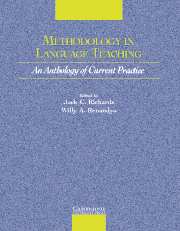Book contents
- Frontmatter
- Contents
- Acknowledgments
- Introduction
- Section I Approaches to Teaching
- Section 2 Lesson Planning and Classroom Management
- Section 3 Classroom Dynamics
- Section 4 Syllabus Design and Instructional Materials
- Section 5 Task and Project Work
- Section 6 Learning Strategies
- Section 7 Teaching Grammar
- Section 8 Teaching Pronunciation
- Section 9 Teaching Speaking
- Section 10 Teaching Listening
- Section 11 Teaching Vocabulary
- Section 12 Teaching Reading
- Section 13 Teaching Writing
- Section 14 Assessment
- Chapter 33 Alternative Assessment: Responses to Commonly Asked Questions
- Chapter 34 Nontraditional Forms of Assessment and Response to Student Writing: A Step Toward Learner Autonomy
- Chapter 35 English Proficiency Test: The Oral Component of a Primary School
- Section 15 Technologies in the Classroom
- Section 16 Professional Development
- Credits
- Author Index
- Subject Index
- References
Chapter 33 - Alternative Assessment: Responses to Commonly Asked Questions
Published online by Cambridge University Press: 10 November 2010
- Frontmatter
- Contents
- Acknowledgments
- Introduction
- Section I Approaches to Teaching
- Section 2 Lesson Planning and Classroom Management
- Section 3 Classroom Dynamics
- Section 4 Syllabus Design and Instructional Materials
- Section 5 Task and Project Work
- Section 6 Learning Strategies
- Section 7 Teaching Grammar
- Section 8 Teaching Pronunciation
- Section 9 Teaching Speaking
- Section 10 Teaching Listening
- Section 11 Teaching Vocabulary
- Section 12 Teaching Reading
- Section 13 Teaching Writing
- Section 14 Assessment
- Chapter 33 Alternative Assessment: Responses to Commonly Asked Questions
- Chapter 34 Nontraditional Forms of Assessment and Response to Student Writing: A Step Toward Learner Autonomy
- Chapter 35 English Proficiency Test: The Oral Component of a Primary School
- Section 15 Technologies in the Classroom
- Section 16 Professional Development
- Credits
- Author Index
- Subject Index
- References
Summary
INTRODUCTION
I was picking up my fourth-grade daughter after school one afternoon when, as she jumped into the car, she exclaimed, “Mom, I've never in my life had none of the above!” I thought for a moment and then realized what she was talking about – a multiple-choice test. Sure enough, as she continued to talk she expressed her frustration at a science test she had taken that afternoon. The teacher had decided to add the choice of “none of the above” to several of the questions, a choice my daughter had not understood. Never having seen it before on a test, she decided that it meant that she was not to circle any of the choices listed for the questions that offered “none of the above” as a response. Consequently, she failed the test.
This anecdote illustrates one of the problems found in contrived tests – including standardized tests as well as teacher-made tests such as the one my daughter took. In this case, the student knew the concept being tested, but was unfamiliar with the language and format of the test. Thus, her test-taking skills were what was lacking, not her scientific knowledge. Other problems that have been discussed in the literature with relation to traditional, standardized tests include norming on a population unlike the one being tested and cultural and language biases (García & Pearson, 1992, 1994; Wrigley & Guth, 1992).
- Type
- Chapter
- Information
- Methodology in Language TeachingAn Anthology of Current Practice, pp. 338 - 343Publisher: Cambridge University PressPrint publication year: 2002
References
- 6
- Cited by



